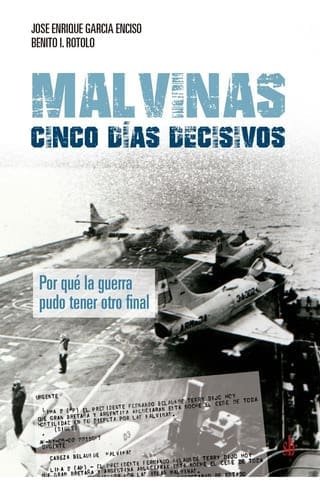No hay productos en el carrito
Ir a la tiendaEnvíos sin recargo
En compras superiores a USD $60
$49.83
COMPRA SEGURA
Los primeros cinco días de mayo de 1982 cambiaron el curso de la guerra de Malvinas. Entre el 1º y el 2 a la madrugada la flota argentina pudo dar una batalla decisiva contra las fuerzas navales británicas. Durante esos días, también, se gestó una negociación que incluía el cese de hostilidades. El 2 de mayo la flota no atacó cuando estaba todo dado para hacerlo. Esa misma tarde, el crucero General Belgrano fue hundido por un submarino británico.
Este libro cuenta dos historias que sucedieron en dos lugares distintos al mismo momento: los testimonios en primera persona de un piloto de la Marina argentina a bordo del portaviones 25 de Mayo, Benito Rotolo, y la de José Enrique García Enciso, convocado por la Secretaría General de Presidencia en 1981 para integrar un grupo confidencial que prepararía la recuperación diplomática definitiva de las Islas Malvinas.
Rotolo, aviador naval, piloto de aviones de ataque, desgrana un relato profesional y sereno, pero sentido, sufrido y expectante que ilumina una experiencia de combate difícil de imaginar. Sus posteriores conversaciones con el Almirante Jeremy Black, al mando del Invencible, y con Alan West, comandante de la fragata Ardent, hundida por aviones argentinos, son un testimonio locuaz. García Enciso conoció en detalle y de primera mano, hora tras hora, las aspiraciones, dudas, errores y engaños que precipitaron un final que pudo haber sido distinto. Quedó bajo su resguardo una copia de documentación confidencial, buen parte de la cual formaría parte del Informe Rattenbach, y otra que aquí se reproduce.
Malvinas: cinco días decisivos no ofrece un relato puramente bélico ni un relato pura-mente diplomático. Ofrece un relato único y detallado de los pormenores de la negociación para demostrar cuán cerca estuvimos de lograr la paz, mientras presenta simultáneamente las consecuencias y vivencias de ese proceso en la zona de guerra. El ataque que no fue y la paz que se hundió. En cinco días se condensa toda la tragedia. Para lo que vino después, por los motivos que el lector conocerá, no había previsión y ninguna planificación para la defensa de las islas.
——————————————————————————————————————————
The first five days of May 1982 changed the course of the Malvinas War. Between the 1st and the 2nd at dawn, the Argentine fleet was able to fight a decisive battle against the British naval forces. During those days, also, a negotiation that included the cessation of hostilities took place. On May 2, the fleet did not attack when everything was ready to do so. That same afternoon, the cruiser General Belgrano was sunk by a British submarine.
This book tells two stories that happened in two different places at the same time: the first-person testimonies of an Argentine Navy pilot on board the aircraft carrier 25 de Mayo, Benito Rotolo, and that of José Enrique García Enciso, summoned by the General Secretariat of the Presidency in 1981 to be part of a confidential group that would prepare the definitive diplomatic recovery of the Malvinas Islands.
Rotolo, naval aviator, pilot of attack planes, gives a professional and serene, but heartfelt, long-suffering and expectant account that illuminates a combat experience difficult to imagine. His subsequent conversations with Admiral Jeremy Black, in command of the Invincible, and with Alan West, commander of the frigate Ardent, sunk by Argentine planes, are a loquacious testimony. García Enciso knew in detail and first hand, hour after hour, the aspirations, doubts, mistakes and deceptions that precipitated an ending that could have been different. He kept a copy of confidential documentation, a good part of which would become part of the Rattenbach Report, and another that is reproduced here.
Malvinas: five decisive days offers neither a purely warlike nor a purely diplomatic account. It offers a unique and detailed account of the details of the negotiation to demonstrate how close we came to achieving peace, while simultaneously presenting the consequences and experiences of that process in the war zone. The attack that was not and the peace that collapsed. In five days the whole tragedy is condensed. For what came later, for reasons that the reader will know, there was no foresight and no planning for the defense of the islands.
En compras superiores a USD $60
Todas las compras suman rewards y puedes utilizarlos para descontar dinero en tus compras.
Siempre respondemos ante eventualidades.
$70.51


$53.13
Obtené un cupón de descuento para tu próxima compra

